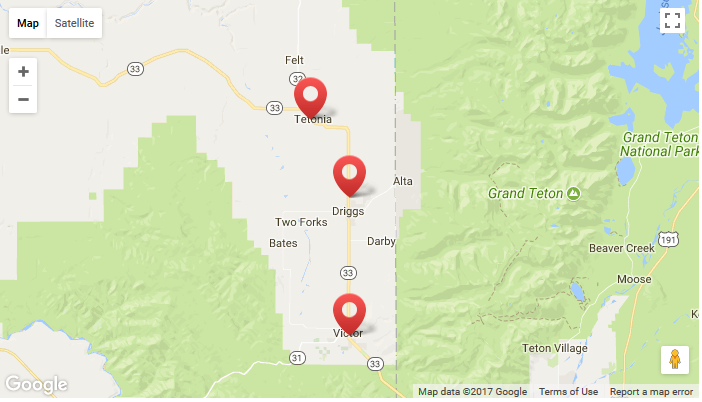Eclipse Preparations from Teton County Fire & Rescue, Aug 10, 2017
All-Hazards Response Fire Department
Teton County Fire & Rescue is an all-hazards response fire department with three stations and 55 career and reserve firefighters. Our firefighters are well trained and experienced in all aspects of structural and wildland firefighting, paramedic-level ambulance service, aircraft rescue firefighting, technical rescue, vehicle extrication, and hazardous materials response.

Station 1 is located at 911 North Hwy 33 in Driggs (just north of the Driggs-Reed Memorial Airport); the phone number is 208-715-5201.
Station 2 is located at 60 Elm Street in Victor (just east of the City building); the phone number is 208-715-5202.
Station 3 is located at 3204 Perry Avenue in Tetonia (just north of the Tetonia Park).
Current Burn Ban
Effective immediately, Teton County Fire & Rescue has issued burn restrictions for Teton County, Idaho. Until fire conditions improve, burn permits will not be issued and fires requiring a burn permit will not be permitted.
Recreational fires do not require a burn permit and must adhere to the following stipulations:
- Fires must be contained within an improved fire pit in a developed area
- Fires must be at least 25 feet from any structure or other combustible material
- A responsible adult must tend the fire at all times
- A means of extinguishing the fire must be present at all times.
- A fire is considered recreational in nature when the pile size is 3 feet or less in diameter and 2 feet or less in height.
Driving in Teton Valley
Attendance estimates for Teton Valley range wildly from 50,000 to 100,000 people. Wherever the actual number lands on that spectrum, Teton Valley’s roadways will be congested during the peak eclipse travel dates. As a result, emergency response may be affected due to heavy traffic.
- Always yield to emergency vehicles. This means immediately drive to a position parallel to the nearest edge or curb and stop. Remain in that position until the authorized emergency or police vehicle has passed. When yielding to an emergency vehicle, do not block an intersection.
- Whether you need to drive from one end of the valley to the other, or you’re just driving around town, be patient and give yourself ample time.
- If you need emergency assistance, know your location. Use mile markers or other identifiable markers to help first responders find you.
Be Prepared
Weather conditions differ around our mountain valleys and peaks, and temperatures can vary by ten degrees or more from one place to another. During August in Teton Valley, you’ll typically find the sun is high in the sky, the days are long, the day-time temperatures can warm into the 80s, and evenings cool down to the 50s and often require a jacket for comfort. At high altitudes, the sun’s effects, whether good or bad, are magnified.
- Be sure drink plenty of water; sugary or alcoholic beverages can be more dehydrating than hydrating.
- Don’t forget to use sunscreen. It can take less than twenty minutes for skin to redden in our UV Index.
- Dress in layers to be prepared for any mountain weather conditions.
- Keep food (and water) with you in case you can’t access a store quickly.
- Have an emergency kit and an emergency plan. Make sure family members or friends back home know your schedule, when you are expected to return, and your emergency plan if something happens.
Fire Prevention
The hot, dry weather of August brings the peak of wildfire season. With the surge in eclipse visitors, we must be alert to the increased potential for man made fires. The most effective way to protect yourself, your home, or your campsite from fire is to identify and remove fire hazards. To reduce the potential for fire, take a few minutes to perform these fire prevention tips:
- Install smoke alarms on every level of your home.
- Test and clean smoke detectors monthly and replace batteries at least twice a year.
- Use propane and charcoal grills outdoors only.
- Contain any recreational fire by using an actual fire pit structure. (A fire is considered recreational in nature when the pile size is 3 feet or less in diameter and 2 feet or less in height.)
- Extinguish your recreational fire completely before leaving it unattended.
- Place grills away from tents, structures, deck railings, and out from under eves and overhangs.
- Stop using portable gel fuel; improper use causes serious risk of flash fires and burns.
- Store gas-powered equipment in an outside shed or garage, separate from the home.
- Store gasoline in an approved safety container.
- Dispose of trash, brush, or tree trimmings before they accumulate on your property.
- Make sure all outside electrical receptacles have ground fault circuit interrupters and are in good working condition.
- Make an escape plan with two ways out of every room and practice it with your family.
- Display your house number in a place that is visible from the street.
